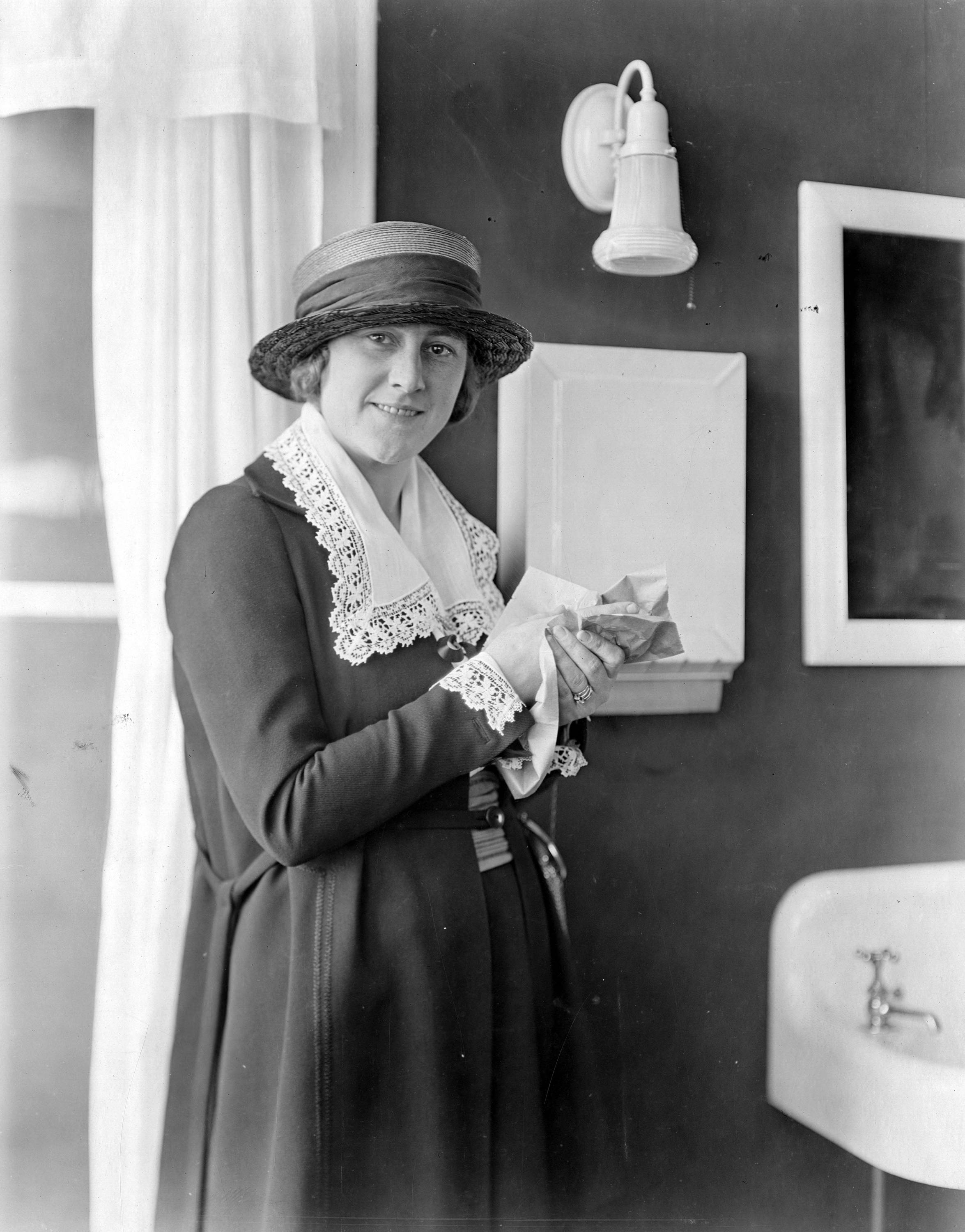Tip-tapping out some new words in my current story and my main character uses “Warm water and a handful of paper towels…” And it occurs to me, ‘Wait. When were paper towels invented?’ (I readily admit, this doesn’t sound like the most riveting action, but … you’ll see.)
I don’t stop every time a question like this occurs to me while writing. It kills flow. Usually, I put a bracket [] around it and come back to it — I drop brackets in for fact checks, or anything that needs extra attention after the first draft is done, like when I need character names. Sometimes I just don’t have a name ready, so I write [bad guy’s favorite plumber] or whatever so I know who it is and find a suitable name. But a quick glance at Wikipedia

should answer this important paper towel question for me. Right?
According to the article I found on Wikipedia, paper towels were invented in 1907 and look to be commonplace by the 1920s. Perfect. For my later 1930s story, my main character could totally use him some paper towels.
Running an image search, I found a wonderful, in-depth history of the leading manufacturer of paper towels in the period, the Brown Company of New Hampshire. The article mentioned that during the Depression (i.e. during my later 1930s story), “Demand decreased. Profits shrank. In 1935, Brown Company filed for bankruptcy and the Brown family lost ownership.”
So, the later 1930s were not a booming time to be in the paper towel business, nor a great time of using them. So, it looks like instead of “Warm water and a handful of paper towels…” it’s going to be something different. For now. The whole scene may get scrapped in revision, but that moment is now far better, and a small moment to reveal more of my Character’s character, and that’s a good thing.
As a National History Day judge, I’m among the chorus of historians who bemoan the use of Wikipedia as the only stop for research by students. Not that Wikipedia isn’t amazing. Not all that long ago, the question of when paper towels were invented would probably leave me at the mercy of an old-ish marketing pamphlet giving precious little actual information, and I’d have to wait a few days to get that answer through a research librarian. But really, Wikipedia is only a starting point. Without what was there (and first of all, let’s appreciate the fact there was an entry on the history of paper towels in the first place!), I wouldn’t have had my other information for search criteria to dig just a little deeper.
If I really had to know as close to 100% as possible, I’d dig up financials of places like the place my hero is using paper towels at the state, county, or city archives. I’d check with the corporate collections, and even try to interview some people who were alive in that place and time. But this is just paper towels. Wikipedia saying yes they were available would be fine for 99.999% of readers. The only reader whose reading experience would be ruined would be the timber industry historian, but you know what; I want that person to read and enjoy my books too.
So, thank God for the internet, but really, thank you for the people putting their research ‘out there’ never really knowing how, when, or to whom it may prove useful.
Like this post? Here’s more about historical research:
BINGO! At the Intersection of History and Slang
How to know Things are Bound to Get Worse
About the Author: Benjamin L. Clark writes and works as a museum curator.


Bravo! As a writer of historical fiction I use the internet very heavily, but always with a healthy dose of skepticism!
Absolutely! Many people think History is absolute, but as we know, it isn’t. We speak in probabilities and do our best to understand complications and nuance. Fiction is a great way to explore that.
A pre-published historical novelist myself (Late Antiquity), I love research. And do get pulled out of a story when an author doesn’t appear to care to do any of their own. Not long ago, I ran across yards of lace … five centuries before it ever existed. I’d known the fact (having researched lace for my own work, and having had to eliminate it), but even if I had not it would have seemed off; and, indeed, it was a moment’s peek on Wikipedia to re-confirm, they had lace showing up anachronistically. And pointlessly, at that.
Wikipedia is, I have found, a great starting point. It often provides a good bibliography, and at those links can be found wonderful resources and also the odd tangent, sometimes even useful.
Great post!
Thank you very much! The dreaded, pointless anachronism. I’m sure I’ll do it too some day out of ignorance. I hope I’m able to catch them all before hitting ‘publish’! Actually, in a piece of flash fiction I wrote not too long ago (published by Akashic Books), I had a question like this pop-up. Upon researching a little deeper, I found out I was wrong, but I left the anachronism in. It was something so benign (in a historical sense) but actually central to my story that I left it in. It’ll be a rare reader who spots it. 😉